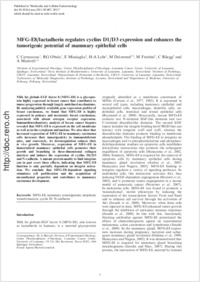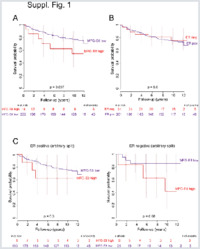MFG-E8/lactadherin regulates cyclins D1/D3 expression and enhances the tumorigenic potential of mammary epithelial cells
- Carrascosa, C. Division of Experimental Oncology, Centre Pluridisciplinaire d’Oncologie, Lausanne Cancer Center, University of Lausanne, Epalinges, Switzerland
- Obula, R. G. Division of Experimental Oncology, Centre Pluridisciplinaire d’Oncologie, Lausanne Cancer Center, University of Lausanne, Epalinges, Switzerland
- Missiaglia, E. Swiss Institute of Bioinformatics, University of Lausanne, Switzerland
- Lehr, H.-A. Institute of Pathology, CHUV, Lausanne, Switzerland
- Delorenzi, M. Swiss Institute of Bioinformatics, University of Lausanne, Switzerland - Département de Formation et Recherche, CHUV, University of Lausanne, Switzerland
- Frattini, M. Laboratory of Molecular Diagnostics, Institute of Pathology, Locarno, Switzerland
- Rüegg, Curzio Department of Medicine, University of Fribourg, Switzerland
- Mariotti, Agnese Division of Experimental Oncology, Centre Pluridisciplinaire d’Oncologie, Lausanne Cancer Center, University of Lausanne, Epalinges, Switzerland - Département de Formation et Recherche, CHUV, University of Lausanne, Switzerland
-
15.08.2011
Published in:
- Oncogene. - 2012, vol. 31, no. 12, p. 1521-1532
English
Milk fat globule-EGF factor 8 (MFG-E8) is a glycoprotein highly expressed in breast cancer that contributes to tumor progression through largely undefined mechanisms. By analyzing publicly available gene expression profiles of breast carcinomas, we found that MFG-E8 is highly expressed in primary and metastatic breast carcinomas, associated with absent estrogen receptor expression. Immunohistochemistry analysis of breast cancer biopsies revealed that MFG-E8 is expressed on the cell membrane as well as in the cytoplasm and nucleus. We also show that increased expression of MFG-E8 in mammary carcinoma cells increases their tumorigenicity in immunodeficient mice, and conversely, its downregulation reduces their in vivo growth. Moreover, expression of MFG-E8 in immortalized mammary epithelial cells promotes their growth and branching in three-dimensional collagen matrices and induces the expression of cyclins D1/D3 and N-cadherin. A mutant protein unable to bind integrins can in part exert these effects, indicating that MFG-E8 function is only partially dependent on integrin activation. We conclude that MFG-E8-dependent signaling stimulates cell proliferation and the acquisition of mesenchymal properties and contributes to mammary carcinoma development.
- Faculty
- Faculté des sciences et de médecine
- Department
- Médecine 3ème année
- Language
-
- English
- Classification
- Biological sciences
- License
-
License undefined
- Identifiers
-
- RERO DOC 27211
- DOI 10.1038/onc.2011.356
- Persistent URL
- https://folia.unifr.ch/unifr/documents/301908
Other files
Statistics
Document views: 106
File downloads:
- pdf: 358
- Supplementary material: 152

